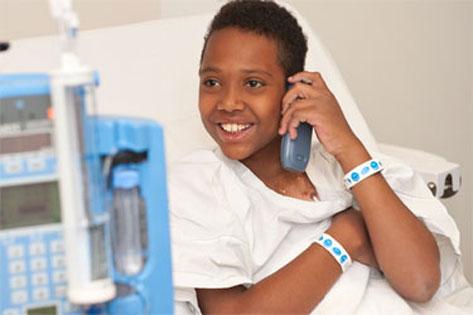Mohamed El Shazly suffers from Hirschsprung's disease - a blockage of the large intestine where nerves are missing from sections of the bowel preventing the muscles in the bowel from working properly.
But it was her remarkable son - who has battled the life-threatening illness with courage all his life - set her at ease straight away.
"I woke up twice in the night thinking something exciting and important is going to happen today," he told his mother even before she told him their four-year wait for a transplant donor was over.
"His response was very excited, very happy," she recalled a week after the surgery.
"He wasn't scared, he started to say, `That's OK mummy, it's what we have to do, that's what we're waiting for, we have to do it'."
The Melbourne teenager is now recovering at the Royal Children's Hospital Melbourne where the surgery occurred.
It was performed in collaboration with the Austin Hospital where Australia's first intestinal transplant on an adult occurred two years ago.
Austin Hospital surgeon Bob Jones led a team of about 25 medical professionals in the 15-hour surgery and said it went smoothly.
It involved removing Mohamed's original liver and small bowel, but retaining his original pancreas and duodenum.
Doctors then transplanted the four donor organs, the liver, small bowel, pancreas and duodenum.
While Mohamed now has two pancreases and two duodenums, only the new organs will function, Professor Jones said.
"The feeling for most of us on the team is relief that it's been done and secondly that Mohammed looks so well," he said.
Mohammed's condition has meant that for most of his life he has been fed via a tube in his veins for 12 hours at a time, five days a week.
Most sports have been too dangerous for him to play and he has been unable to enjoy treats such as lollies and junk food.
Even more serious has been the life-threatening medical complications and infections that have seen him spend three years of his life in hospital.
Mohamed is expected to spend at least the next month in hospital recovering while rejection of the new organs and infection are a very real threat.
RCH head of liver and intestinal transplantation associate professor Winita Hardikar said while Mohamed is recovering steadily the next few months will be challenging.
"There is still a high risk the body will reject the new organs and infection is also possible. We need to monitor his progress closely and provide months of high level care before we can declare the surgery a success," she said.
After that doctors hope he will no longer need to be fed via a tube and can enjoy a diet like any normal boy.
For the avid Hawthorn Football Club fan, playing sport is the thing he most looks forward to, his mother said.


















__small.png)










